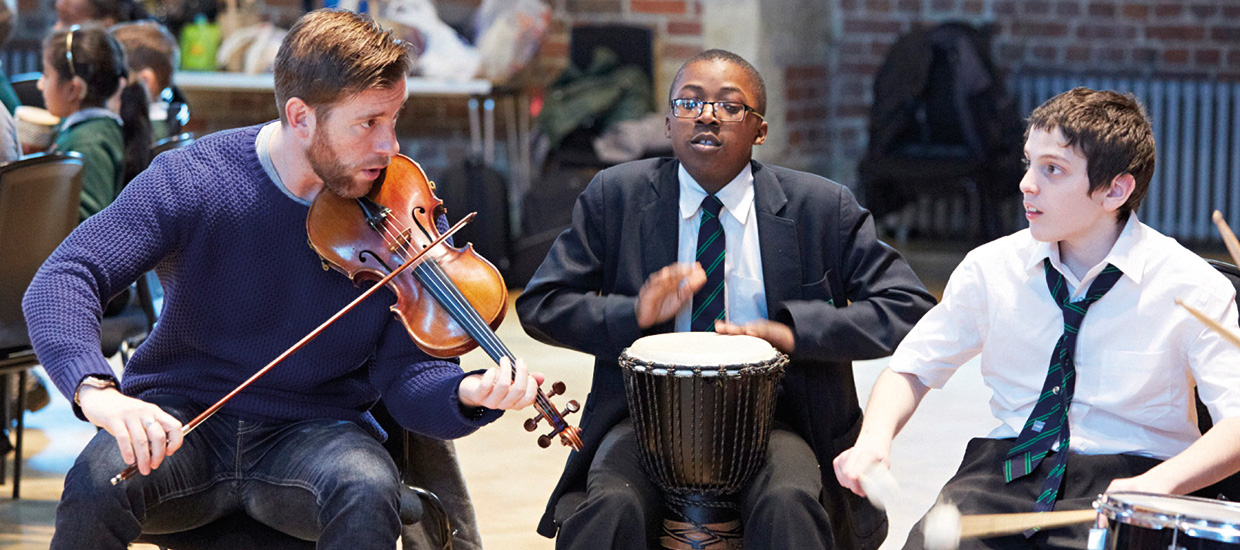Meet the funder: Youth Music
Youth Music is a national charity that invests in music-making projects for children and young people. We asked how it’s helping schools to deliver projects that enrich young people’s lives

What are the main aims of Youth Music?
Our vision is that one day, all children and young people will be able to make music. In order to achieve this, we’re working collaboratively to transform music education in England. Our funding is focused on supporting projects for children and young people who face barriers to music-making as a result of who they are, where they live, or the circumstances they’re facing.
What sort of projects does Youth Music support?
We support around 350 projects across England every year, reaching more than 89,000 children and young people. The projects we invest in support the musical, personal and social development of children and young people, and we also support positive outcomes for organisations and their workforce. Every Youth Music project measures its impact, helping us build a unique national overview.
Projects should be centred on either or both of the following: music-making for children and young people in challenging circumstances; and strategic work supporting the development of the workforce, organisations, and/or the wider sector.
What types of funds are available for schools?
Youth Music
Fund A awards smaller grants of £2,000-£30,000 for high-quality projects that will help to achieve a musically inclusive England. Fund B, meanwhile, awards medium-sized grants of £30,001-£150,000 for high-quality, sustained projects that expand and embed musically inclusive practise within and beyond an organisation.
What criteria does a school need to meet to qualify?
We fund organisations that are based in the UK and delivering work in England for participants residing in England. They must be registered charities or not-for-profit organisations and must be legally constituted and providing activity for a minimum of one year. (If you are not registered with the Charity Commission or Companies House you must supply evidence of this through your constitution.)
Schools are eligible to apply to Youth Music but projects must have a significant element of innovative and genuine partnership involved, benefit the wider community, have a high-quality, musically inclusive approach and a targeted focus on reaching and engaging children and young people in challenging circumstances across the whole project. We do not fund GCSE and A-level music, music curriculum activities that could be supported through Department for Education funding, whole class instrumental tuition or peripatetic music lessons.
This criteria is specific to Key Stage 1 and above and does not apply to nurseries and children
What is the grant application process like? What makes a successful application?
The application process is slightly different depending on the grant applied for. For Fund A there is a one-stage online application process, with three application deadlines per year. You will hear the outcome of your decision around three months after the application deadline. Projects are required to set and work towards achieving three outcomes – these can be musical, personal, social, workforce or organisational. The next deadline is 5 April.
For Fund B there is a two-stage online application process, with application deadlines twice a year. If you are successful, the whole process takes around six months.
Upcoming fund application deadlines can be found at I need funding | Youth Music Network
Is there a follow-up process for those who are successful?
Successful applicants will receive an email containing Youth Music
Successful applicants should visit the
Does Youth Music run any other projects for schools?
The Youth Music Network is a free-to-join online community for everyone whose work involves making music with children and young people. The Youth Music Network is a place for music leaders, youth workers, music teachers and project staff to share opinions and experiences, learn from others, make connections, find work and develop their skills.
Previously-funded projects
Pioneering partnerships
Exchanging Notes is a four-year action research programme pioneering new partnerships between schools and music education providers who normally work in out-of-school settings. Each project works with young people at risk of low attainment, disengagement or educational exclusion, helping them achieve the best musical, educational and wider outcomes through taking part in regular music-making activities.
As part of the programme, Southampton-based community music organisation SoCo Music is running a project pairing specialist music leaders up with two local schools. Rosewood Free School, which caters for children with profound and multiple learning disabilities (PMLD), has been working with SoCo for three years. The project uses a mix of one-to-one music-making sessions, led by SoCo
Grant success
Essex Music Educational Hub realised that opportunities for music-making in the county’s special schools were limited. The hub was successful in applying for Youth Music funding and received a three-year grant. The project involved 2,000 pupils from 25 schools. Each school was paired with a county music tutor and specialist in delivering music in SEND settings. For 10 weeks, the musicians led music-making activities in the school, supporting and working alongside the classroom teachers, giving them the skills to continue once the sessions ended. The long-term impact has been successful partnerships, a highly skilled and confident workforce, and greater musical opportunities, achievement and enjoyment for young people.
Nationwide roll-out
With the help of Youth Music, Charanga has developed a set of SEND-focused online resources, including listening, composing and performing exercises, and fully adaptable lesson plans. All schools across Essex, Southend and Thurrock, including mainstream schools, now have free access to these resources, subsidised by their Music Education Hub. Charanga has been able to take this and share it through the Charanga cloud-based learning platform used by over 100 Music Education Hubs nationwide. Already, more than 7,000 schools across the country can access the new teaching resources, and there are plans to expand the scheme even further.
Although the Youth Music funding is no longer available, you can find many similar funding opportunities in the FundEd grants database, which is regularly updated.
More on grants
